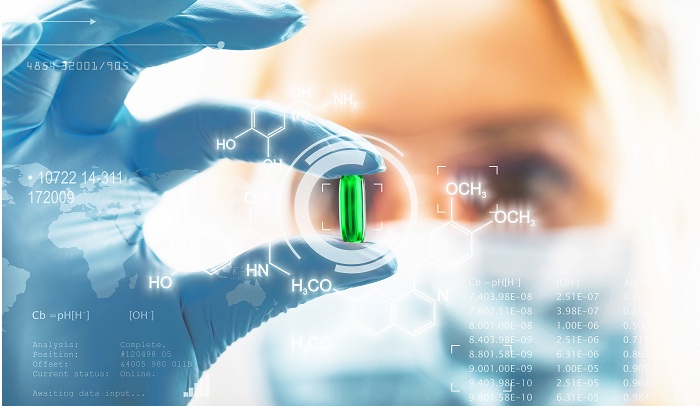Since artificial intelligence (AI) has the exciting potential to transform every sector and change established processes, it is now the talk of the town. The pharmaceutical industry is one of the many areas that AI is starting to have a significant influence on. This might mean that the otherwise drawn-out process of drug development is sped up, improved, and made more affordable.
AI in drug development: A synopsis
Pre-clinical testing for conventional drug delivery often takes three to six years and costs hundreds of millions or even billions of dollars. This makes it a very long and costly procedure.
The healthcare sector uses, on average, 6-7% of the world’s gross domestic product, or between 8.5 and 9 trillion dollars, annually. It may take up to 14 years and cost over $1 billion to bring new medications to market.
This ancient process could undergo a revolution at nearly every stage, including (i) target identification, (ii) molecular simulations, (iii) drug property prediction, (iv) de novo drug design, (v) candidate drug prioritization, and (vi) synthesis pathway generation, if cutting-edge AI tools are applied.
Increasing the pace of research and development
AI methods may be used on huge datasets, including omics datasets and disease connections, during the target identification phase. This makes it possible to understand the processes behind illnesses better and finds unique proteins or genes that may be the focus of creative therapeutic approaches.
Out of the estimated 20,000 proteins in the human proteome, only around 3,000 have been discovered as possible targets for therapy. Future research on AI usage may help identify more medications that might be used as therapeutic targets.
When paired with other systems, like AlphaFold, the use of AI to anticipate three-dimensional structures of targets may even be revolutionary for medication design, as it may expedite the process of creating drugs that will assure successful binding to their target.
A deep learning system that was recently trained on a dataset of known pharmacological compounds and their related attributes is one example of how artificial intelligence is being utilized for drug development. It suggests new therapeutic molecules with desired qualities. These recommendations may help with the quick and effective creation of new therapeutic candidates.
Improving the accuracy of predictions
Notably, AI is also capable of predicting the characteristics of drugs; these instruments are used to forecast important aspects of potential drugs, including toxicity, physiological activity, and physicochemical characteristics. As a result, there may be a greater chance that the medication candidates will be both safe and effective when used on humans and an improved procedure overall.
When medications are used together for the same or different conditions in the same patient, drug-drug interactions may occur and have negative consequences that might cause issues for the drug development process. By properly predicting the interactions of new drug pairings to lower the likelihood of adverse effects and speed up the drug development process to generate safer and more effective pharmaceuticals, machine learning is being used to solve this issue.
In order to identify new compounds for cancer therapy, researchers trained a deep learning algorithm on a large dataset of known cancer-related chemicals and the biological activity that goes along with them. This is an example of a successful use of AI in drug development. Finding new drug candidates is one way that this study may have a big impact on how cancer is treated in the future.
Cutting down the expenses and time required
Artificial intelligence (AI) has the potential to be a game-changer in the drug research and development process, given its high cost and protracted timeline.
From synthesis to testing, artificial intelligence (AI) has expedited several phases of drug development. These cutting-edge techniques have allowed researchers to concentrate on therapeutic candidates with lower toxicity and more promising effectiveness. With the AI technologies also evaluating the big datasets, this may also lead to an improved drug discovery process, reducing the time and expense of pre-clinical testing and perhaps influencing drug design to properly match the therapeutic target.
One AI method used in the pharmaceutical sector to forecast biological targets based on chemical structure is called silico target fishing technology. Target protein selection and identification may be expedited with the use of target fishing technology, which helps to lower the overall cost of experiments throughout the drug development process.
Obstacles and restrictions
Despite the growing popularity of AI’s advantages, there are a number of difficulties and restrictions that come with using these cutting-edge technologies.
The availability of appropriate data is a significant obstacle for AI, as the tools’ training requires a tremendous quantity of data. The reliability and accuracy of the findings may be affected if there is a lack of consistent, high-quality, or restricted access to the necessary quantity of data.
How AI Could Revolutionize The Life Sciences And Drug Development
As AI techniques are currently unable to replace the knowledge and experience of human researchers, they cannot be used in lieu of traditional experimental procedures. AI techniques can only make predictions based on the data that is currently available; still, researchers must validate and interpret the findings.
It is feasible to expedite the creation of new pharmaceuticals and enhance the drug discovery process by combining the predictive power of AI with the knowledge and experience of researchers.
Moral considerations
Concerns about fairness and prejudice are raised by AI techniques, making ethical issues a major hurdle.
One of the main issues with AI usage is that it may make decisions that might affect people’s health and well-being, such as what medications to produce, which clinical trials to enroll in, and how to distribute products on the market.
The possibility of bias in AI algorithms might lead to unjust treatment of different groups of people and uneven access to medical care, undermining the concepts of justice and equality.
Automation-related job losses raise ethical questions as well as whether workers may be impacted by AI’s advancement, necessitating the creation of support programs for individuals who may be impacted.
Strong data privacy and security measures, as well as routine reviews and audits of AI systems and models for bias, are two ongoing topics and recommendations that attempt to address these problems.
Prospects for the future and conclusion
AI is revolutionizing a number of industries, including drug development, where cutting-edge models are being used to advance targeted treatments and personalized medicine via improved drug discovery procedures and new therapeutic targets.
AI has the potential to have a revolutionary influence on the drug development and discovery process, improving every step of the procedure from target identification to efficient drug design. The future of drug development may be significantly impacted by this helpful tool, which is always changing due to the ongoing improvement of AI models and software.



















